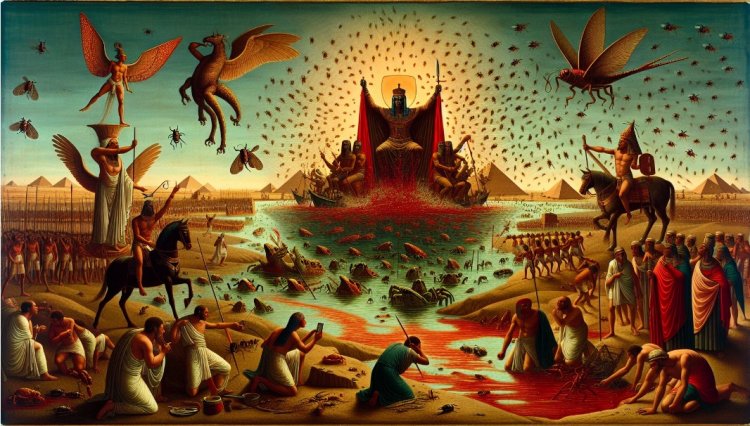The Plagues of Egypt: Unmasking the False Gods
Witness ten divine upheavals in ancient Egypt! Delve into the Plagues' biblical narrative, explore potential interpretations, and discover their enduring cultural impact.

Introduction
In the biblical narrative, the plagues of Egypt serve a significant purpose. They are not simply random acts of destruction but rather a deliberate unmasking of the false gods that the Egyptians worshipped. These gods were believed to have control over various aspects of Egyptian life, and by displaying their power over these gods, Yahweh, the God of the Hebrews, showed his superiority.
In ancient Egypt, the worship of false gods was deeply ingrained in the culture. Each god represented different aspects of nature, society, and daily life. The Egyptians believed that by offering sacrifices and performing rituals, they could ensure the gods' favour and maintain order in the world. However, the plagues challenged this belief by exposing the powerlessness of these false gods.
The connection between the plagues and the false gods is evident in each specific plague. For example, the first plague, the turning of the Nile into blood, directly challenged the authority of Pharaoh and his claim to be the incarnation of the god Horus. The Nile, considered the lifeblood of Egypt, was supposed to be under Pharaoh's control. By turning it into blood, Yahweh demonstrated that Pharaoh and the Egyptian gods had no power over nature.
Another plague, the infestation of frogs, targeted the goddess Hekhet, who was responsible for the control of frog populations in the Nile. The abundance of frogs became a nuisance and disrupted the balance of the ecosystem. This plague revealed Hekhet's inability to maintain order and highlighted Pharaoh's failure to fulfil his role as the protector of Ma'at, the Egyptian concept of cosmic balance and harmony.
The gnats and fly plague had a direct impact on the Egyptian priests, who were required to maintain cleanliness to perform their religious duties. The presence of gnats and flies, which could be translated as lice, rendered the priests ritually unclean and unable to carry out their daily functions in the temples. This disrupted the worship of the false gods and undermined the authority of the Egyptian priesthood.
In conclusion, the plagues of Egypt were not merely acts of devastation but a deliberate demonstration of Yahweh's power and the insignificance of the false gods worshipped by the Egyptians. Each plague targeted a specific aspect of Egyptian religious belief, exposing the limitations and powerlessness of their gods. In the following sections, we will analyse each plague in detail to gain a deeper understanding of their significance in the biblical narrative.
The Nile turned to blood.
In Egyptian mythology, the Nile River held immense importance. It was considered the lifeblood of Egypt, providing water for irrigation and fertility for the land. The Egyptians thought that Pharaoh, who they saw as the embodiment of the god Horus, was in charge of the Nile. The turning of the Nile into blood was a direct challenge to Pharaoh's authority and his claim to be a divine ruler. By doing so, Yahweh demonstrated his power over the gods and their supposed control over nature.
The plague also jeopardised Pharaoh's ability to uphold Ma'at, the Egyptian concept of cosmic harmony and balance. As the protector of Ma'at, Pharaoh was responsible for ensuring that order was maintained in the world. However, the plague of the Nile turning to blood revealed his powerlessness and inability to fulfil his role. It showed that the false gods worshipped by the Egyptians had no control over nature and that Pharaoh's claim to divine authority was false.
The Egyptian priests, who were believed to have the ability to perform rituals and appease the gods, were unable to fix the plague. They could only mimic it, making the situation worse. This demonstrated their lack of power and their dependence on Yahweh's judgements. The priests' inability to maintain cleanliness due to the gnats and fly plague further disrupted the worship of the false gods. According to Herodotus, the Egyptian priests would shave their entire bodies every other day to prevent infestations and maintain ritual purity. However, the presence of gnats and flies rendered them ritually unclean, preventing them from carrying out their religious duties.
The significance of Yahweh's power over the gods is evident in each plague. Through the plagues, he exposed the limitations and powerlessness of the false gods worshipped by the Egyptians. Each plague targeted a specific aspect of Egyptian religious belief, challenging the authority of Pharaoh and the Egyptian priesthood. Yahweh's superiority over the gods was a direct affront to the Egyptian pantheon and a demonstration of his power and sovereignty.
The Plague of Frogs
In ancient Egyptian mythology, frogs were associated with the goddess Hekhet, who was responsible for the control of frog populations in the Nile. As a result, the infestation of frogs during the plague was a direct attack on Hekhet's authority and her ability to maintain order in the ecosystem.
The overabundance of frogs caused significant ecological disruptions. They became a nuisance to the Egyptian people, invading their homes and disrupting their daily lives. The frogs also disrupted the balance of the ecosystem as they consumed large quantities of insects, leading to an increase in pest populations.
Pharaoh, as the supposed incarnation of the god Horus, held the responsibility of maintaining the balance of Ma'at, the Egyptian concept of cosmic harmony. However, the plague of frogs highlighted Pharaoh's failure to fulfil this role. It demonstrated his inability to control and manage the natural world, exposing the false claims of his divine authority.
Furthermore, the plague of frogs revealed Hekhet's failure to maintain order. As the goddess assigned to control frog populations, her inability to prevent the infestation showcased her powerlessness. This further undermined belief in the Egyptian pantheon and questioned the efficacy of the false gods worshipped by the Egyptians.
The plague of frogs also had implications for the Egyptian people's daily rituals and religious practices. The incessant croaking and presence of frogs disrupted their ability to perform ceremonies and offerings to the gods. It hindered their connection with the divine and undermined their faith in the effectiveness of their religious rituals.
In conclusion, the plague of frogs during the plagues of Egypt served as a direct challenge to the goddess Hekhet and her association with frogs. It highlighted the ecological impact of an overabundance of frogs and the disruption it caused to the balance of the ecosystem. The failure of Hekhet and Pharaoh to maintain order revealed the limitations of the false gods worshipped by the Egyptians and questioned their power and authority.
The Plague of Gnats and Flies
The gnats and fly plague had a direct impact on the Egyptian priests, who were required to maintain cleanliness to perform their religious duties. In ancient Egypt, the priests held significant roles in the worship of the false gods. They were responsible for maintaining ritual purity and conducting daily functions in the temples.
Introduction to the Egyptian priests' ritual cleanliness:
-
The Egyptian priests believed that maintaining cleanliness was crucial for their religious practices.
-
They would shave their entire bodies every other day to prevent infestations and maintain ritual purity.
-
This practice was aimed at keeping lice and other unclean elements away, as being ritually unclean would hinder their ability to serve in the temples.
An explanation of the priests' shaving practices to prevent infestations:
-
Herodotus, a Greek historian, observed this practice and noted that the Egyptian priests shaved their bodies regularly to avoid lice and other unclean elements.
-
The priests believed that lice and other infestations were signs of ritual impurity and could hinder their ability to perform their religious duties.
-
By maintaining cleanliness through shaving, the priests aimed to ensure they could carry out their daily functions without any hindrance.
Analysis of Herodotus' observation and its connection to the plague:
-
Herodotus' observation provides valuable insight into the priests' dedication to ritual purity and their efforts to prevent infestations.
-
The presence of gnats and flies during the plague would have rendered the priests ritually unclean, preventing them from fulfilling their religious obligations.
-
This observation highlights the impact of the plague on the priests' ability to serve in the temples and maintain order in the worship of the false gods.
Discussion of the consequences of the priests' inability to perform their duties:
-
The gnat and fly plague had serious repercussions for the Egyptian priesthood and the worship of the false gods.
-
Without the priests' ability to maintain cleanliness and perform their daily functions, the temples were unable to operate effectively.
-
The gods worshipped by the Egyptians relied on the priests to receive their daily offerings and maintain order in their religious practices.
-
The inability of the priests to carry out their duties effectively undermined the authority and power of the false gods and dealt a blow to the Egyptian religious system.
In conclusion, the plague of gnats and flies had a significant impact on the Egyptian priests and their ability to perform their religious duties. The presence of gnats and flies interfered with the priests' dedication to ritual cleanliness through shaving, making them unclean in that regard. This disruption had severe consequences for the worship of the false gods, as the priests' inability to maintain order in the temples undermined the authority of the gods and crippled the religious system of Egypt.
The Impact on Egyptian Worship
An explanation of the importance of temples in Egyptian worship:
-
The temples were sacred spaces where the Egyptians believed they could connect with the gods.
-
They were centres of religious activity and rituals where the priests performed their duties.
-
The temples were believed to be the dwelling places of the gods, and offerings were made to them to ensure their favour.
Discussion of the rituals performed by the priests in the temples:
-
The Egyptian priests played a crucial role in the worship of the false gods.
-
They maintained ritual purity and cleanliness to serve in the temples.
-
They performed daily functions such as opening the temple doors and offering sacrifices to the gods.
-
The priests were responsible for maintaining order in the religious practices and ensuring the gods' satisfaction.
Analysis of the effects of the plagues on the operation of the temples:
-
The plagues, particularly the infestation of gnats and flies, disrupted the priests' ability to maintain ritual purity.
-
The presence of gnats and flies rendered the priests ritually unclean, hindering their performance of religious duties.
-
This disruption had severe consequences for the worship of the false gods, as the priests' inability to carry out their functions effectively crippled the operation of the temples.
-
The temples were unable to receive their daily offerings and maintain order, undermining the authority of the false gods.
Exploration of how the gods' dependence on the priests undermines their power:
-
The plagues exposed the gods' reliance on the priests for their worship and maintenance.
-
Without the priests' ability to perform their duties, the gods were unable to receive their offerings and maintain their power over the natural world.
-
This dependence on the priests undermined the gods' authority and revealed their powerlessness.
-
Yahweh's superiority over the Egyptian gods was demonstrated through the plagues, as he showed his power and control over nature.
In conclusion, the plagues of Egypt had a significant impact on Egyptian worship. The plagues disrupted the temples' sacred spaces, making it difficult for the priests to carry out their religious duties. This disruption undermined the authority of the false gods and revealed their dependence on the priests for their power. The plagues served as a demonstration of Yahweh's superiority and power over the gods worshipped by the Egyptians.
The Significance of the Plagues
Reflection on the broader implications of the plagues:
-
The plagues of Egypt were not random acts of destruction but deliberate demonstrations of Yahweh's power.
-
Each plague targeted specific aspects of Egyptian religious belief, challenging the authority of Pharaoh and the Egyptian pantheon.
-
By displaying his power over the false gods, Yahweh asserted his superiority and sovereignty.
Analysis of the humiliation and defeat of the false gods:
-
The plagues exposed the powerlessness of the false gods worshipped by the Egyptians.
-
Each plague directly challenged the authority and claims of a specific deity, demonstrating their inability to maintain order and control nature.
-
The priests, who were believed to have power over the gods, were unable to fix the plagues, further revealing the gods' powerlessness.
Discussion of the theological message conveyed through the plagues:
-
Through the plagues, Yahweh asserted his power and sovereignty over all creation, including the false gods worshipped by the Egyptians.
-
The plagues highlighted the futility of idolatry and the worship of false gods, emphasising the importance of worshipping the one true God.
-
The plagues served as a demonstration of Yahweh's love and concern for his people, the Hebrews, and his desire to liberate them from oppression.
Exploration of the liberation of the Hebrews as the ultimate goal:
-
The plagues were a means to an end, with the ultimate goal being the liberation of the Hebrew people from slavery in Egypt.
-
Yahweh used the plagues to demonstrate his power and superiority over the Egyptian gods, weakening Pharaoh's resolve and ultimately leading to the Hebrews' freedom.
-
The plagues were a catalyst for the Exodus, a pivotal event in Hebrew history that solidified their identity as God's chosen people.
In conclusion, the plagues of Egypt served as a significant turning point in the biblical narrative. They exposed the powerlessness of the false gods and emphasised Yahweh's sovereignty. The plagues had a broader theological message, challenging the belief in idolatry and highlighting the liberation of the Hebrews as the ultimate goal. Through the plagues, Yahweh demonstrated his love for his people and his desire to free them from oppression.
Conclusion
In conclusion, the plagues of Egypt served a significant purpose in the biblical narrative. They were not just random acts of destruction, but deliberate demonstrations of Yahweh's power and the insignificance of the false gods worshipped by the Egyptians.
Throughout each plague, Yahweh targeted specific aspects of Egyptian religious belief, challenging the authority and claims of the false gods. The plagues revealed the powerlessness of these gods and their inability to maintain order and control over nature.
By turning the Nile into blood, Yahweh directly challenged Pharaoh's authority and his claim to be the incarnation of the god Horus. The infestation of frogs exposed the goddess Hekhet's failure to maintain order in the ecosystem. And the presence of gnats and flies disrupted the Egyptian priests' ability to perform their religious duties and maintain the worship of the false gods.
Through these plagues, Yahweh demonstrated his superiority and triumph over the Egyptian pantheon. He showed his power and control over nature, exposing the limitations of the false gods worshipped by the Egyptians.
The enduring significance of the plagues lies in their theological message. They challenge the belief in idolatry and emphasise the importance of worshipping the one true God. The plagues also highlight Yahweh's love and concern for his people, the Hebrews, and his desire to liberate them from oppression.
The plagues of Egypt were a means to an end, leading to the liberation of the Hebrews from slavery. They solidified the identity of the Hebrews as God's chosen people and demonstrated Yahweh's power and sovereignty over all creation.
Overall, the plagues of Egypt serve as a powerful reminder of the insignificance of false gods and the enduring significance of Yahweh's triumph in the biblical narrative.



 admin
admin 










